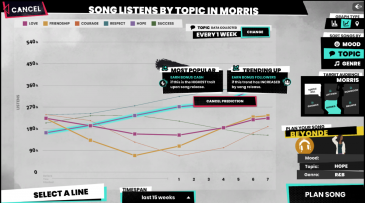Every day, information is collected on our daily habits, from the groceries we purchase, the music we stream, the websites we visit, and even our physical locations. What happens to all this data? Some are sold for advertising purposes, some may be used for research, while other data is used by particular interest groups. It might be reported as line graphs, bar graphs, or heat maps. But how do we learn to read and accurately interpret the reality presented by these charts and graphs, and to understand the stories behind the numbers? Now, more than ever, it’s critical that children acquire the skills necessary to understand and read the data that is collected about them and others. For many, understanding and interpreting data will be a necessary skill in their future careers.

In most schools, the ideas and practices of data science can be hard to find. Students may collect data and explore data representations in science classes, or they might encounter basic statistics in a math class. Yet data pertains to a multitude of contexts: from how, when, where, and by whom information is being collected, how decisions are made with data, and the ensuing consequences of these decisions for peoples’ lives. The global push to include computer science education in schools offers a new opportunity for expanding the teaching of data science—for exploring how computers collect, sort, and filter data; how data can be transformed and combined; and how data can be represented to tell stories about a whole host of phenomena. New York City’s CS4All initiative, which aims to bring computer science experiences to every public school student in the city by 2025, even lists data and data analysis as a strand of its K-12 CS Education Framework. We think there are also great opportunities for informal learning experiences that support and broaden data science learning outside the classroom.

Designed for middle school kids, Beats Empire is a game that invites a player to explore data by stepping into the role of a music studio manager. The manager selects artists to sign, develops songs in different genres, and make investments with the goal of topping the music chart. The player must analyze data by making sense of various graphs that show listeners’ interests in different music genres, moods, and topics in boroughs across a fictional city. In this way, core data science practices are situated in a context that is meaningful and close to the children’s interests and simultaneously highlights the prevalence of data science in our lives. Beats Empire is a free game funded by the National Science Foundation and developed by learning scientists from Teachers College, Columbia University, SRI, the University of Wisconsin-Madison, Georgia Tech, and Digital Promise in collaboration with Filament Games.
In addition to being a game for playing with data science, Beats Empire is also a formative assessment tool. As such it helps teachers to see what their students are learning about data and data analysis, and offers insight into the topics that are particularly challenging for each student. Using a dashboard that tracks students’ activities in the game, teachers can examine which data representations students use, whether students are making reasonable choices about what kind of songs to record, or whether students’ predictions about the popularity of a particular genre align with the data on listener interests.
While we have found Beats Empire to be a powerful tool for helping students to see the real-world use of data, students should also be encouraged to be critical about the role of data in society. AlgoWorld (coming Fall 2020) invites middle and high school students to think about how data algorithms, and how data is manipulated or cleansed, contributes to social inequity. In AlgoWorld, players are asked to examine the outcomes of algorithms used in domains as diverse as traffic control, bank loan distribution, and policing. By tweaking and adjusting these algorithms, students can learn about how algorithms work, and see the outcome of their changes in a simulated world, discovering some simple guidelines for contributing to more equitable use of personal data. They explore playfully whether data points like gender or race are appropriate factors for algorithms used for making job offers, for example.
While these games may be designed for middle or high school students, that doesn’t mean that parents and caregivers shouldn’t try their best at going platinum in hip-hop or tweaking algorithms to create a more equitable world. After all, understanding data is an important skill for all of us! So be sure to check out Beats Empire, and keep an eye out for AlgoWorld this Fall!
 Marleen Villeroy is a doctoral candidate in Instructional Technology at Teachers College, Columbia University. She holds a Master’s degree in the Humanities from the University of Chicago. Her work focuses on how children recognize the effects of algorithms in their lives and their communities.
Marleen Villeroy is a doctoral candidate in Instructional Technology at Teachers College, Columbia University. She holds a Master’s degree in the Humanities from the University of Chicago. Her work focuses on how children recognize the effects of algorithms in their lives and their communities.

